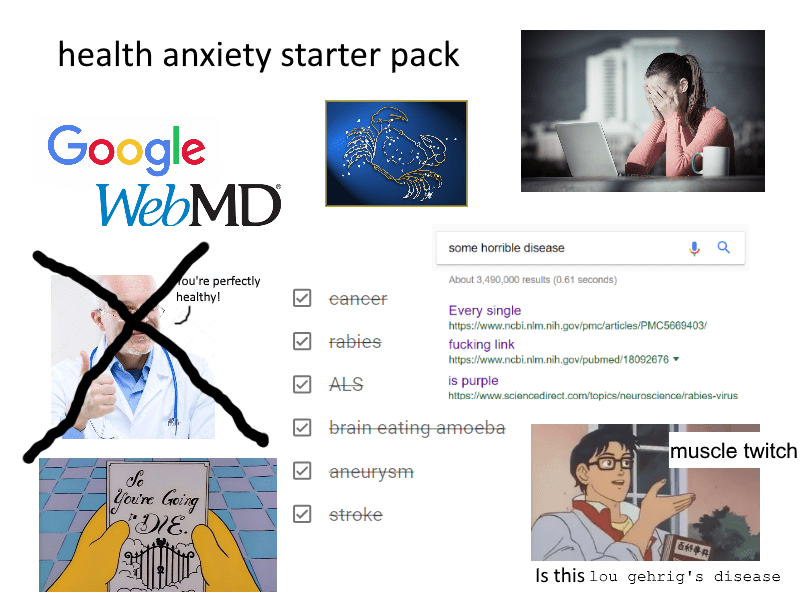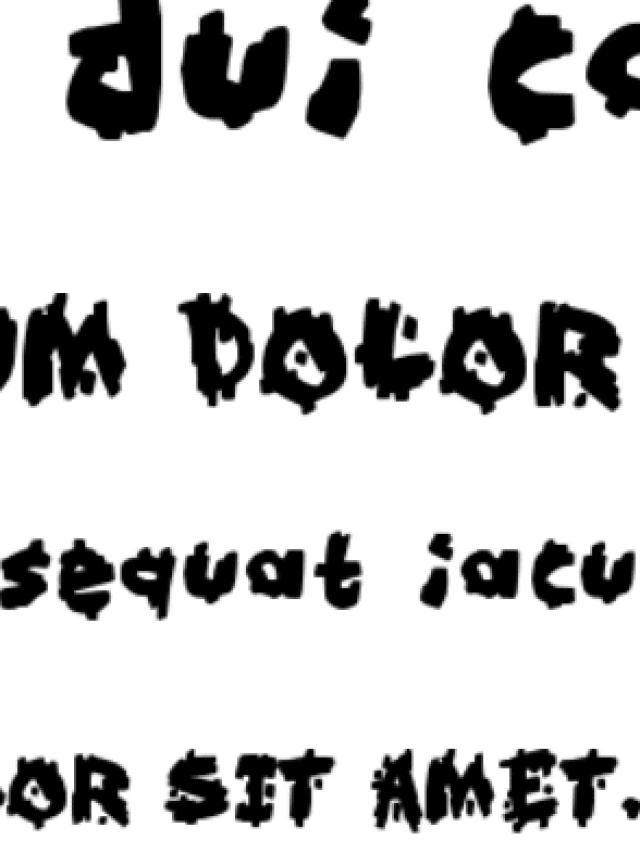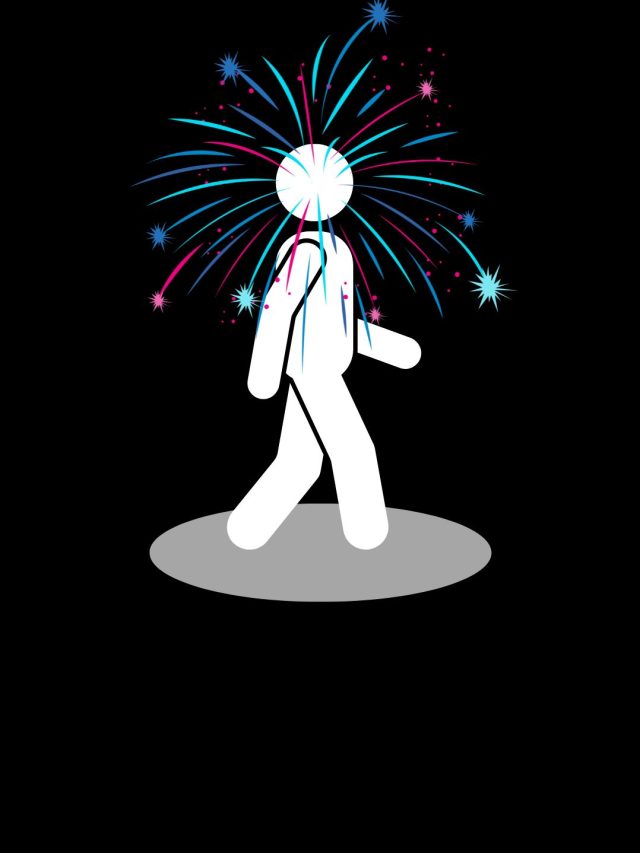Free online access to quality health information is nothing short of amazing, but it does create an unfortunate problem.
What is health anxiety?
When it comes to health, many of us have a certain “anxiety.” This anxiety takes the form of worrying about your own health, fearing you have a fatal disease, worrying about your own suffering, etc. Sometimes we are preoccupied with our own health so much that it causes stress and hampers our day-to-day lives. This is called Health anxiety – irrational worrying that you are seriously ill or your actions will make you ill. When health anxiety gets severe and becomes a diagnosable disorder, it’s called Hypochondriasis.
Many people suffer from health anxiety. Estimates range[1] from 6% of the general population to 20% of hospital outpatients. Hypochondria is typically higher[2]in those with a medical condition. Some may dramatically alter their lives and decisions just to avoid unlikely chances of getting ill. They may overreact to objectively mild symptoms. Or they may spend a lot of time or money on health-related behaviors even though they don’t feel at ease. This has become worse because of the pandemic, especially because we can’t see the disease or know enough about it to feel secure.
Health anxiety typically contains irrational beliefs[3] like:
- Thinking in certain ways can cause or prevent diseases
- Illness-related thoughts can spoil health
- Thinking about illness is beyond one’s control
Now, hypochondria becomes cyberchondria when we go on the internet.
What is cyberchondria?
Many people are already stressed about their health, and then they repeatedly search for more information about their concerns. That causes even more anxiety & stress. It becomes a vicious cycle of increasing health anxiety & online search. Cyberchondria[5] is an unhealthy behavior pattern where repeatedly searching for health information online causes additional anxiety and stress about health. There is excessive worry and preoccupation with using the internet to monitor and understand one’s health in cyberchondria. Eventually, cyberchondria can degrade mental health.
According to research[6], cyberchondria has 2 typical patterns:
- Healthy anxiety
- Excessive online search for health information
Before the internet, hypochondriacs could only talk with doctors or read books to learn more about their health. Their coping methods needed a lot of effort. That sort of effort is no longer needed because we can find everything on the internet within seconds.
Potential Causes
Research suggests[7] people are likely to develop cyberchondria if they have a high sensitivity to anxiety and high intolerance for uncertainty in the context of health. Seeking as much information as possible is an uncertainty reduction behavior.
What does this mean for you?
High sensitivity to anxiety usually describes how easily you develop anxiety due to small problems. In other words, minor issues can easily amplify anxiety, and it is harder to shield yourself from anxiety-causing events & experiences.
High intolerance for uncertainty usually means it is harder for you to accept things you don’t understand or can’t figure out. It also means not knowing enough or not having enough control over things in life causes anxiety, discomfort, and stress.
These 2 factors are also related to each other[8]. Sensitivity to anxiety tends to be higher in those who browse health-related content. And, intolerance for uncertainty might amplify anxiety.
One goal of cyberchondria[9] could be to seek reassurances about health. Another goal could be to feel like you are actively doing something about your health, especially to feel in control when your medical condition or fears feel out of your control.
Difference between Hypochondria (health anxiety) & Cyberchondria
Although cyberchondria is closely related to health anxiety, cyberchondria has slightly different characteristics. One study suggests[10] that cyberchondria disrupts day-to-day living more than hypochondria. And, people tend to use more healthcare services because of cyberchondria. A person with hypochondria might be chronically stressed because of a health issue. But a person with cyberchondria may spend a lot of time on medical review sites and constantly connect with doctors, download apps, or purchase products on top of high daily stress. This also makes cyberchondria a community health problem because it involves more people, and the internet facilitates more health anxiety.
How Cyberchondria affects the doctor-patient relationship
Health anxiety, which is a component of cyberchondria, creates an additional problem for a doctor-patient relationship. High health anxiety encourages people to go online and search for information before even visiting a clinic. One study[11] observed that people who are high on health anxiety are less satisfied with their doctor’s consultation if they do an internet search before the consultation. This dissatisfaction can then again encourage more online searching. However, this problem can turn into a positive doctor-patient relationship[12] if patients discuss their health-related online searches with their doctors and doctors involve patients more in their health-related decision.
How the internet makes health anxiety worse
We can easily google symptoms and self-diagnose. Even though there are many reliable medical information sources, most of us are not trained to understand medical science. We are riddled with biases, and most people lack the knowledge to interpret research reports in a practical medical context.
This creates a problem. We don’t understand our health. And searching Google just tells us the list of potential diseases we may have. But those symptoms are often out of context – a context that we are not trained to identify. So after typing in heavy cough, high heart rate, fever, and body ache, we might think we have many dozens of diseases. Do they make sense? Some of them. This ambiguity adds fear, and we tend to believe the worst-case scenario.
Humans have tendencies that complicate things.
- Our own research isn’t good enough: We trust ourselves when we do our “research” but unfortunately, it is likely to be poor research. Sometimes trusting an expert is better than “seeing it for yourself” because you may not know what to look for. An expert may still have to walk you through the evidence to actually “see it”. This is also true for fact-checking and trusting sources.
- We are biased to not remain objective: We all fall prey to the confirmation bias. If we believe we are seriously ill, we will pay more attention to those google searches that prove it. This makes our health anxiety much, much worse. A high intolerance for uncertainty can also bias us to interpret things negatively[13].
- We trust Google like it’s a know-all: We trust Google as an informational authority, but not for the right reasons. Google helps us find things we are looking for on the internet. The rest is up to our interpretation. Google isn’t the doctor. In fact, we follow the idea that “If someone in the world has an answer, Google has an answer.“
It’s very easy to Google our symptoms and believe we have some serious illness. But we are very likely to be wrong.
- We don’t know how to interpret important medical terminology, statistics, risk factors, correlation & cause-effect relationships. Numbers come in a context.
- We don’t know how to google. Yup, most of us don’t know how to google stuff well enough. Those small text snippets we see? They are just a few sentences from a whole article. Without the article, the sentences are pulled out of context. Sometimes, there are completely irrelevant sentences in the snippet.
- We don’t know what to look for and what physical sensations really mean to us. Can stress explain the symptoms? Or do you have a virus? Or have you not slept well and got some dust allergy? We can’t know.
How do you avoid the Cyberchondria trap?
- Limit how much you Google about your health condition.
- Visit or call up a doctor, or have a quick consultation via a medical platform like Practo.
- Talk with a pharmacist.
- Avoid trying to make sense of everything you read. If you don’t have the training, you’ll probably misinterpret things. Let an expert help you interpret your condition.
- Stick to a few medical sources on the internet and don’t repeat the same search. If you are unhappy with what you read, call up a doctor instead of going to many websites and forums.
Deeper solutions to deal with health anxiety
Like other forms of anxiety, health anxiety can be treated using both self-help techniques and therapy.
- Thinking: Use cognitive defusion techniques to reduce the believability of negative health-related thoughts.
- Feeling: Use emotional regulation techniques to tolerate uncertainty about health and accept that there are things out of your control.
- Habits: Make a list of your top health concerns and write them in a journal. Then write what you can or cannot do about them next to each concern. Once you write them down, review them with a doctor. This will help you clarify your thoughts without letting them jump around.
- Time & money: Restrict how much time and money you spend on health-related information and health services.
- Self-image & Self-esteem: If your health anxiety makes you feel bad about your body or lowers your self-esteem, use self-affirmations to feel better.
- Physical well-being: Practice body-based mental health activities like Yoga & Mindfulness.
- Professional help: If things seem out of your control, meet a licensed psychologist or psychiatrist who might use evidence-based therapies and psychiatric medication to treat health anxiety.
Sources
[2]: https://www.eurekaselect.com/120007/article
[3]: https://www.sciencedirect.com/science/article/abs/pii/S0165178115303164
[4]: https://www.reddit.com/r/starterpacks/comments/9rf3w4/health_anxiety_starter_pack/
[5]: https://www.tandfonline.com/doi/abs/10.1586/ern.12.162
[6]: https://www.sciencedirect.com/science/article/abs/pii/S0165032718315775
[7]: https://www.sciencedirect.com/science/article/abs/pii/S0165032715003912
[8]: https://www.sciencedirect.com/science/article/abs/pii/S0005791614000275
[9]: https://www.tandfonline.com/doi/abs/10.1586/ern.12.162
[10]: https://www.sciencedirect.com/science/article/abs/pii/S0165178117318437
[11]: https://www.sciencedirect.com/science/article/abs/pii/S0738399116300428
[12]: https://www.jmir.org/2017/1/e9/
[13]: https://www.sciencedirect.com/science/article/abs/pii/S0005791615300501

Hey! Thank you for reading; hope you enjoyed the article. I run Cognition Today to capture some of the most fascinating mechanisms that guide our lives. My content here is referenced and featured in NY Times, Forbes, CNET, and Entrepreneur, and many other books & research papers.
I’m am a psychology SME consultant in EdTech with a focus on AI cognition and Behavioral Engineering. I’m affiliated to myelin, an EdTech company in India as well.
I’ve studied at NIMHANS Bangalore (positive psychology), Savitribai Phule Pune University (clinical psychology), Fergusson College (BA psych), and affiliated with IIM Ahmedabad (marketing psychology). I’m currently studying Korean at Seoul National University.
I’m based in Pune, India but living in Seoul, S. Korea. Love Sci-fi, horror media; Love rock, metal, synthwave, and K-pop music; can’t whistle; can play 2 guitars at a time.




























